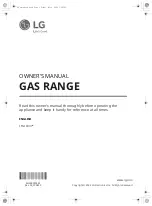
Safety Instructions
Operating Instructions
Safety Instructions
Operating Instructions
Care and Cleaning
Tr
oubleshooting T
ips
Consumer Support
www.GEAppliances.ca
SAVE THESE INSTRUCTIONS
READ AND FOLLOW THIS SAFETY INFORMATION CAREFULLY.
Do not use oven cleaners. No commercial oven cleaner or oven liner protective coating of any kind
should be used in or around any part of the oven. Residue from oven cleaners will damage the inside
of the oven when the self-clean cycle is used.
■
CAUTION:
DO NOT LEAVE FOOD OR COOKING
UTENSILS, ETC. IN THE OVEN OR ON THE COOKTOP DURING
SELF-CLEANING MODE OF OPERATION.
■
Do not clean the door gasket. The door gasket is
essential for a good seal. Care should be taken not to
rub, damage or move the gasket.
■
Before self-cleaning the oven, remove shiny,
silver-colored oven racks (on some models) and all
other cookware.
■
Be sure to wipe up excess spillage before starting the
self-cleaning operation.
■
If the self-cleaning mode malfunctions, turn the oven
off and disconnect the power supply. Have it serviced by
a qualified technician.
■
Clean only parts listed in this Owner’s Manual.
■
The surface units are automatically disabled during the
self-clean cycle. Make sure that all surface unit controls
are turned off at all times during the self-clean cycle.
Any surface unit that is set to an on position, while the
self-clean cycle is operating, will automatically come on
after the self-clean cycle is finished, and could result in
an on, unattended surface unit. Wait until the self-clean
cycle is finished to set and use the surface units.
■
Gray porcelain-coated oven racks (on some models)
may be cleaned in the oven during the self-clean cycle.
SELF-CLEANING OVEN
Stand away from the range when opening the oven door. Hot air or steam which escapes can cause
burns to hands, face and/or eyes.
■
Do not heat unopened food containers. Pressure could
build up and the container could burst, causing an
injury.
■
Keep the oven vent unobstructed.
■
Keep the oven free from grease buildup.
■
Place the oven rack in the desired position while the
oven is cool. If racks must be handled when hot, do not
let pot holder contact the heating elements.
■
When using cooking or roasting bags in the oven,
follow the manufacturer’s directions.
■
Pulling out the rack to the stop-lock is a convenience in
lifting heavy foods. It is also a precaution against burns
from touching hot surfaces of the door or oven walls.
■
Do not use the oven to dry newspapers. If overheated,
they can catch on fire.
■
Do not use the oven for a storage area. Items stored in
an oven can ignite.
■
Do not leave paper products, cooking utensils or food
in the oven when not in use.
■
Do not use aluminum foil to line oven bottoms.
Improper installation of aluminum foil may result
in a risk of electric shock or fire.
OVEN
■
The purpose of the warming drawer is to hold hot
cooked foods at serving temperature. Always start with
hot food; cold food cannot be heated or cooked in the
warming drawer.
■
Do not use the drawer to dry newspapers. If overheated,
they can catch on fire.
■
Do not leave paper products, plastics, canned food or
combustible materials in the drawer.
■
Never leave jars or cans of fat drippings in or near your
drawer.
■
Do not warm food in the drawer for more than two hours.
■
Never place, use or self-clean the oven drawer pan in
the oven.
■
Do not touch the heating element or the interior surface of
the drawer.
These surfaces may be hot enough to burn.
REMEMBER:
The inside surface of the drawer may be
hot when the drawer is opened.
■
Use care when opening the drawer. Open the
drawer a crack and let hot air or steam escape before
removing or replacing food. Hot air or steam which
escapes can cause burns to hands, face and/or eyes.
■
Do not use aluminum foil to line the lower oven drawer.
Foil is an excellent heat insulator and will trap heat
beneath it. This will upset the performance of the
drawer and it could damage the interior finish.
WARMING DRAWER
(on some models)
5






































